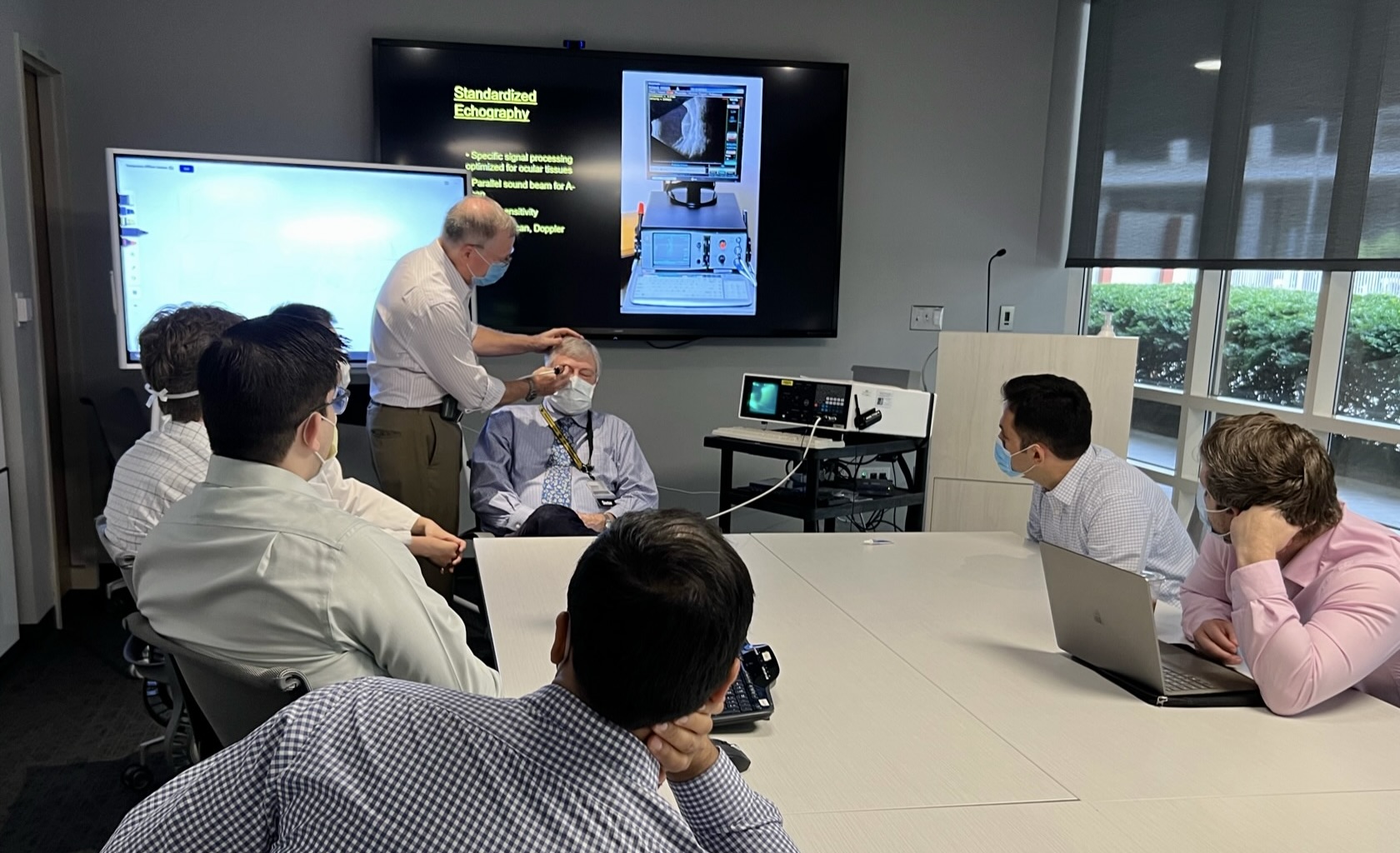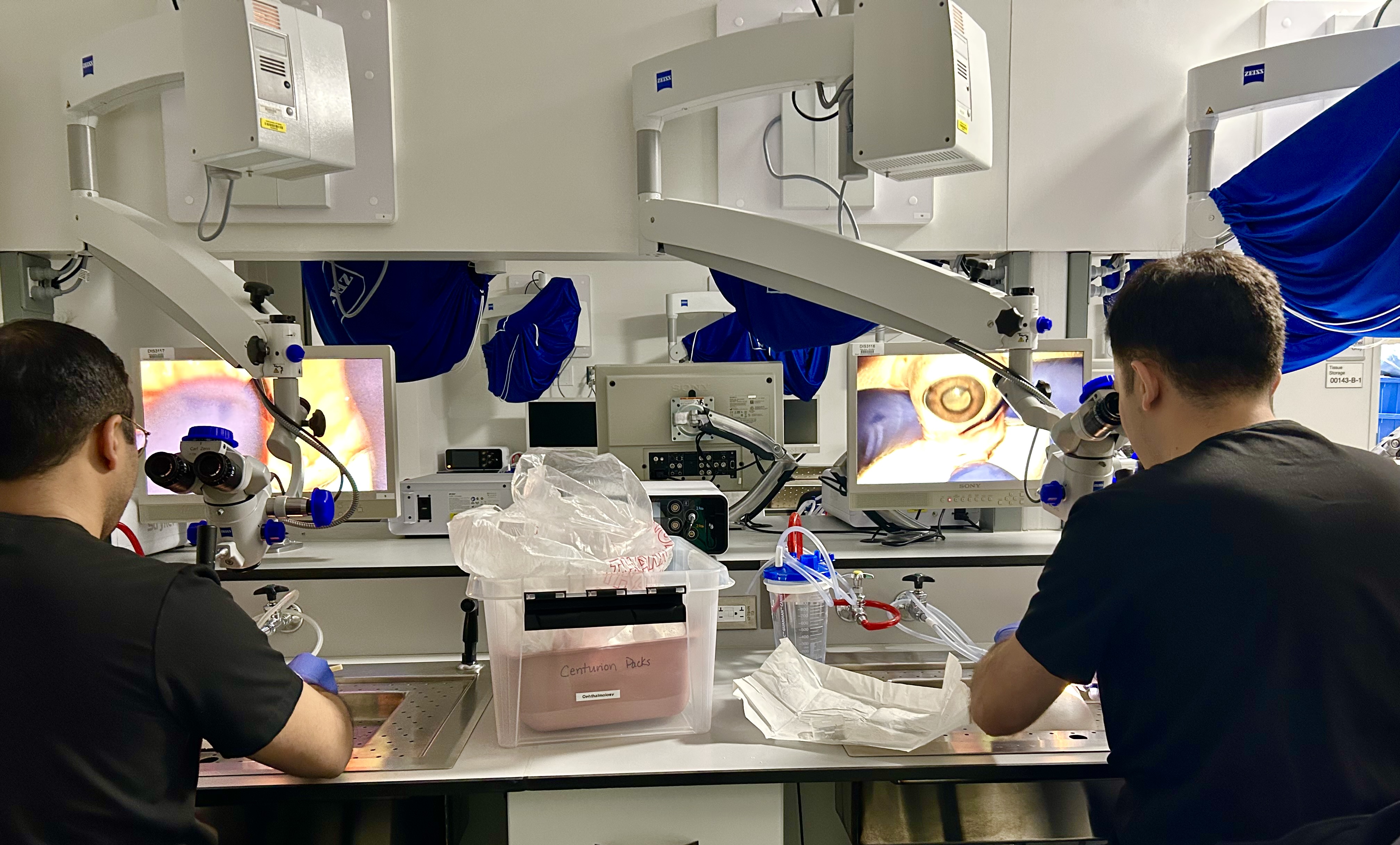Fellowships offered
- Vitreoretinal Surgery: Two-year fellowship in vitreoretinal surgery. AUPO compliant, participates in the SF match.
- Medical Retina: One-year fellowship in medical retina with subspecialty exposure to uveitis, ocular oncology, and inherited eye diseases. AUPO compliant, participates in the SF match.
- Mina Chung fellowship: One-year fellowship in inherited eye diseases named in honor of former fellow Dr. Mina Chung. This fellowship is offered outside of the match. Please direct inquiries to Dr. Elaine Binkley (elaine-binkley@uiowa.edu).
Salaries, Benefits, Rotations, and Call Schedule
| Pay Grade Levels | Stipends 2024-2025 |
| PGY-5 | $78,800 |
| PGY-6 | $81,100 |
| PGY-7 | $84,800 |
Benefits/Leave/conferences
Medical, dental, life, and malpractice insurance are available for fellows through the University of Iowa (please see https://gme.medicine.uiowa.edu/benefits/paid-time-and-leave-information for more information).
University of Iowa Hospitals & Clinics provides house staff with 15 work days and six weekend days of paid time off each year. House staff members arrange for paid time off with their Program Director or his/her designee. Special requests for absences as a result of family problems, deaths, board examinations must also be reviewed and approved by the Program Director.
Retina fellows are also granted five days of conference time to attend academic conferences of their choosing. The retina service will cover expenses for each fellow to attend one academic conference per year.
Time away from training for leaves that are necessary due to illness will be made up at the discretion of the Program Director in accord with the needs of the house staff member to complete essential components of his/her training program.
Female house staff members are entitled to up to six weeks of paid disability (maternity) leave for each pregnancy. If additional leave, either before or after delivery, is required for medical reasons associated with the pregnancy, this time will also be treated as paid disability leave up to a maximum of an additional four weeks beyond the initial six weeks of maternity leave.
Non-birth parent house staff members, including domestic partners as defined by UI policy, have available five working days of paid time off for parental leave related to each recent birth or adoption of their child.
Rotations

*Junior fellows and medical retina fellows rotate ~1-2 days a week in injection clinic on site where they perform scheduled and add on clinic injection procedures. Senior fellow B has research time on Friday afternoons. All rotations are at the UIHC main hospitals and clinics, there is no satellite or VA coverage required.
Call
Call coverage begins January 1 each year and is divided evenly between the two vitreoretinal surgery fellows in each class. There is no call coverage for the first six months or the last six months of the fellowship. Fellows supervise and work closely with the ophthalmology residents while on call. Call is retina only (i.e. no primary open globe or non-retina consult coverage required). Medical retina fellows do not cover call.
Conferences
 Retina imaging conference is held every Monday from 6:45 am-7:45 am and attended by all retina fellows and faculty to share interesting cases from the week
Retina imaging conference is held every Monday from 6:45 am-7:45 am and attended by all retina fellows and faculty to share interesting cases from the week- Daily “work rounds” are held post clinic by each faculty member with the fellows rotating in their clinic to review the cases from the day. On Tuesdays this is hosted by Dr. Ed Stone with a special emphasis on inherited eye diseases
- Department of Ophthalmology morning rounds is held Mondays, Wednesdays, Thursdays, and Fridays from 8:00-8:45 am. First year fellows are invited to attend prior to clinic, second year fellows attend when the operating room schedule permits
- Retina surgical rounds are held once a month in the second half of the year over dinner (provided)
- Journal clubs are held quarterly, often at a faculty member’s home
- Department of Ophthalmology Clinical Conferences (national speaker invited for each subspecialty) ~one Friday Q2 months
Research
- Fellows are expected to participate in at least one research project per year and are supported to present their work at one national conference per year of their choosing
- Fellows are expected to present at the annual resident and fellow research day
- Innumerable opportunities to collaborate with the retina faculty on general vitreoretinal surgery topics or subspecialty topics of the fellow’s choosing at both the clinical and translational level
- Access to all University of the University of Iowa Health Sciences Library resources and software (i.e. Endnote, Adobe Photoshop etc.). Dedicated ophthalmology library on site
 Fellows have broad-based exposure to general medical retina pathology and procedures (injections, lasers, diabetes, age-related macular degeneration) as well as complex disease with subspecialty exposure to inherited retinal diseases, uveitis, and ocular oncology
Fellows have broad-based exposure to general medical retina pathology and procedures (injections, lasers, diabetes, age-related macular degeneration) as well as complex disease with subspecialty exposure to inherited retinal diseases, uveitis, and ocular oncology- Unique, world-class training in inherited eye diseases with a dedicated day each week with Dr. Ed Stone
- Access to high-quality imaging modalities including conventional and swept-source optical coherence tomography, optical coherence tomography angiography, standard and wide-field fluorescein angiography, indocyanine angiography, Clarus, Optos, Topcon and RetCam photography, and dedicated ocular ultrasound and ERG services
- Opportunity to tailor schedule depending upon the fellow’s interest in broad-based medical retina or sub-specialty interest
- Medical retinas fellows are integrated into the clinics with first-year surgical retinal fellows but do not have call responsibilities
- Surgical fellows perform an average of 475 cases as primary surgeon during their training. Fellows are granted increasing autonomy as they advance through their training
- Diverse group of faculty training backgrounds and subspeciality surgical interests (seven surgical faculty)
 Fellows see their patient’s pre-op, are invited to participate in all surgeries, and follow their patients post operatively
Fellows see their patient’s pre-op, are invited to participate in all surgeries, and follow their patients post operatively- 23, 25, and 27-guage surgical instrumentation available
- Alcon Constellation and DORC EVA platforms are utilized with the Resight viewing system
- Balance of primary scleral buckle and vitrectomy surgery
- All aspects of both “bread and butter” and complex cases (PVR, trauma, pediatric vitreoretinal surgery, traction retinal detachment) are covered with the exception of ROP surgery
- Exposure to surgical procedures for uveitis
- Exposure to surgical procedures for inherited eye disease (subretinal surgery, gene therapy)
- Exposure to ocular oncology procedures (plaque brachytherapy, tumor biopsy, vitrectomy for primary vitreoretinal lymphoma)
- Secondary IOLs with multiple techniques including scleral sutured lenses, Yamane fixation, and anterior chamber lenses
- Intra-operative OCT
- All surgeries are performed on-site in either the ambulatory surgery center located within the hospital main operating room suite. All cases are staffed by dedicated “eye team” surgical nurses
- There is an Eyesi surgical simulator equipped with the retina training modules available in the new onsite wetlab
Resources
- All fellows have their own workspace in the dedicated retina fellow office
- Access to all University of Iowa and Departmental resources including software (EndNote, Adobe Photoshop, Adobe Acrobat) and references (dedicated ophthalmology library, online access to all University of Iowa resources through PubMed)
- Ability to serve as author on EyeRounds website entries in collaboration with the ophthalmology residents